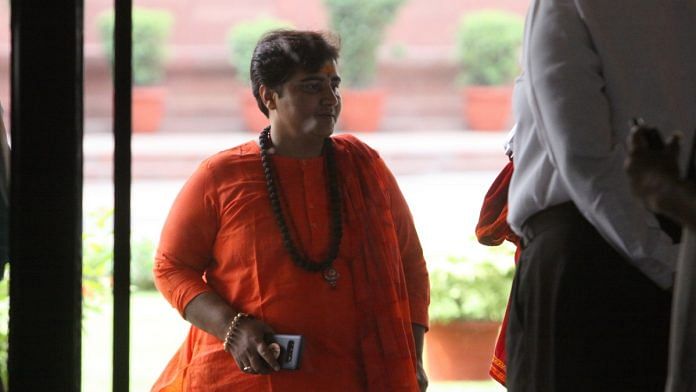New Delhi: The controversy over Malegaon blast accused Pragya Thakur’s inclusion — and subsequent removal following her purported remarks about Mahatma Gandhi’s assassin Nathuram Godse — as a member of the parliamentary consultative committee on defence has raised a larger question about the criteria for nomination on such committees.
The opposition parties were up in arms against Thakur’s inclusion largely on account of propriety as consultative committees, attached with ministries, are only a forum for informal discussions on policy issues and their implementation. Their members are nominated by the ministry of parliamentary affairs in consultation with political parties.
The larger question, however, concerns the nomination process in the 24 parliamentary standing committees for ministries and departments, which look into demands for grants, proposed laws and policies. Rajya Sabha chairman and Lok Sabha Speaker nominate members and chairpersons of these committees in consultation with political parties. As it is, the ruling party has a say in the nomination of chairpersons.
The current composition of these committees raises a question whether domain knowledge and expertise should be given priority in nominating the chairpersons of panels. For instance, Jual Oram, the former Tribal Affairs Minister, is heading the Defence parliamentary standing committee, P.P Chaudhary, the former minister of state for law and corporate affairs is chairing the committee on external affairs and, Radha Mohan Singh the former agriculture minister is leading the Railways committee. These ministers had been left out of Modi 2.0 government.
Experts and analysts are of the view that senior leaders, who don’t carry the requisite expertise and background, have been made chairpersons of these committees — mostly by way of political accommodation.
P.D.T Achary, former general secretary of the Lok Sabha, said this is increasingly becoming a trend, but wasn’t always the case.
“Earlier, some thought used to be put into assigning a chairperson,” Achary told ThePrint. “The chairpersons used to have at least some knowledge about the committee they chair. Today, the opposite is increasingly becoming the case.”
Achary said that many appointments now may just have to do with political compulsions of accommodating those who weren’t given a ministerial position.
“Political parties have other compulsions. They want to accommodate senior party leaders who have not been made ministers. It is seen as a compensation of sorts,” he said.
For instance, the parliamentary standing committee on urban development is headed by Jagdambika Pal who had quit the Congress to join the BJP ahead of 2014 Lok Sabha elections but failed to get a ministerial berth in Narendra Modi-led government. This committee was in the news recently due to the absence of most of the members, including Gautam Gambhir who was seen eating jalebi and poha with V.V.S. Laxman in Indore, from a meeting on air pollution.
Also read: Pragya Thakur was Amit Shah’s personal choice to take on Digvijaya Singh in Bhopal
‘Not having chairpersons with expertise will affect final result’
Veerappa Moily, former CM of Karnataka , who headed the finance committee in 2018 told ThePrint that if a chairperson doesn’t have expertise in the subject, it will reflect in the final result.
“The background and expertise of the chairperson makes a lot of difference,” Moily told ThePrint. “Unless you have the administrative experience and knowledge, you won’t be able to go in-depth in the subject. You will blindly accept whatever Bills come to you without any scrutiny.”
Moily says that the committee never saw any political partisanship, and that is what should always be the case. “During my time as chairperson of the finance committee, there were only four members from the Congress party. Rest were all from other parties, mostly the BJP. We never let politics influence our vetting of bills.” Moily said.
Incidentally, in 2018, BJP MPs who were in a majority in the parliamentary standing committee on finance, headed by Moily, had stalled the adoption of a draft report that was critical of the NDA government’s demonetisation move. BJP MP Nishikant Dubey who had led the BJP MPs to stall it has been moved to the parliamentary committee on Information Technology.
The IT committee is chaired by senior Congress leader Shashi Tharoor, who had previously served as Minister of State for External Affairs (2009–2010) and Minister of Human Resource Development (2012–2014), besides serving as an official in the United Nations for several years before joining Politics.
Last year Tharoor headed the committee on external affairs.
Experts and other resources at chairpersons’ disposal
The chairpersons of parliamentary committees are entitled to take help from experts in the fields, if they wish to. “The chairperson has various resources at his/her disposal,” T.K. Viswanathan, the secretary general of the 15th Lok Sabha told ThePrint. “They are assisted by a lot of experts, and can call anybody for help. So I don’t think it is necessary that the chairperson has knowledge in the field.”
Achary said it is the staff of the secretariat that carries the weight of a lot of the work done by the committees “The staff members of the secretariat are experts in drafting recommendations. They have studied the subject at length and know most things by heart,” he said.
“So while the knowledge of a chairperson adds to the efficacy of the committee, there won’t be a great loss if the chairperson isn’t particularly knowledgeable about the subject — since is the committed staff that does the bulk of the work,” he added.
Moily too said that the chairperson is entitled to call experts for help. “The finance committee head, for instance, the chairperson can call the SEBI regulator, or heads of banks like ICICI,” he said.
Also read: Modi hoped Rajapaksa trip will shift focus from Maharashtra loss. But Pragya Thakur happened




fish rots from the top.